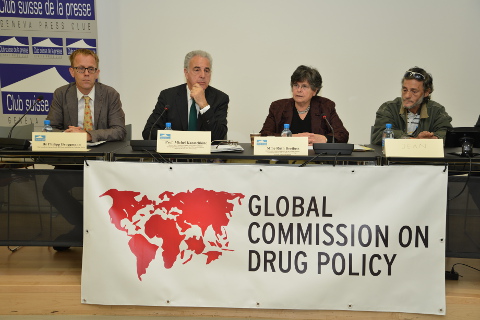
One of the health issues related to drug use and prison that pop out in the statistics is a growing epidemic of hepatitis-C, a potentially fatal variant of hepatitis that's mostly treatable but at substantial cost to our health care ... and prison ... system.
The explosion of incarcerating American citizens ... with nearly all of the increase attributed to drug offenses ... raises another issue but one that is inseparable from the War on Crime.
In 1980, the U.S. incarcerated 150 per 100,000 citizens in prison and, in 2012, 30 years later, the U.S. incarcerates 760 per 100,000 citizens in prison. That's a five-fold ... 500% ... increase. That's the incarceration-driven War on Drugs.
By comparison, according to Fareed Zakaria's article "Incarceration Nation" (Time Magazine, 2012-April-02), Mexico only incarcerates 208 per 100,000 ... Brazil 242 per 100,000 ... England 153 per 100,000 ... South Korea 97 per 100,000 ... France 96 per 100,000 ... Germany 90 per 100,000 ... and Japan 63 per 100,000. The United states incarcerates 3-times more citizens per 100,000 than Brazil and 5-times more than England.
In dollars, during 2009, 1.3-million Americans were arrested for drug possession. At an estimated $45,000 each, the incarceration-driven War on Drugs cost our economy an estimated $60-billion annually to incarcerate (if all were jailed).
In total, the United States now incarcerates 6-million citizens ... and, as Adam Gopnik cites in his article "The Caging of America" (The New Yorker magazine, 2012-January-30), that's more than Stalin held in the Soviet Union's Gulags!!
According to the United States Justice Department's Bureau of Prisons, drug offenses ranks first with 47% of all federal inmates there for drugs ... That's 3-times more than the second ranked of 16% there for weapons, explosives, and arson ... 4-times more than third ranked 11% imprisoned for immigration offenses ... 6% imprisoned for sex crimes and 6% for extortion, fraud, and bribery ... 4% each for robbery and for burglary, larceny, and property offenses ... and less than 1% each for any other crimes.
According to sources focused on this issue like Conscious Life News, whereas the United States federal prisons incarcerate nearly 90,000 on drug offenses, the states incarcerate an additional 240,000 Americans in prison on drug offenses. That's 330,000 Americans incarcerated for doing drugs ... and very often serving long, mandatory sentences.
And, each of those indicted and/or imprisoned on drug offenses will be marked for life as a criminal when applying for jobs. In some states, they are banned for life from voting.
AOL JOBS reports that people with a drug possession conviction have a 50% less chance of being called back after an interview or getting the job.
NPR reports: "While it's generally illegal for employers to indiscriminately deny all applicants with criminal records, many still do. A quick look at New York job postings on Craigslist, for example, reveals common caveats: "absolutely no felony convictions" or "must have clean criminal record."
So what are we waiting for? Let's decriminalize drug possession, allow for regulated sale of marijuana (like we do with liquor), release all those now incarcerated for drug possession, and expunge the criminal records of any mention of drug possession offenses.
What do you say?
by Steve Reichenstein
No comments:
Post a Comment